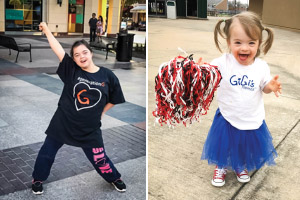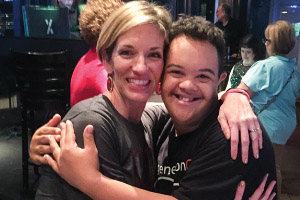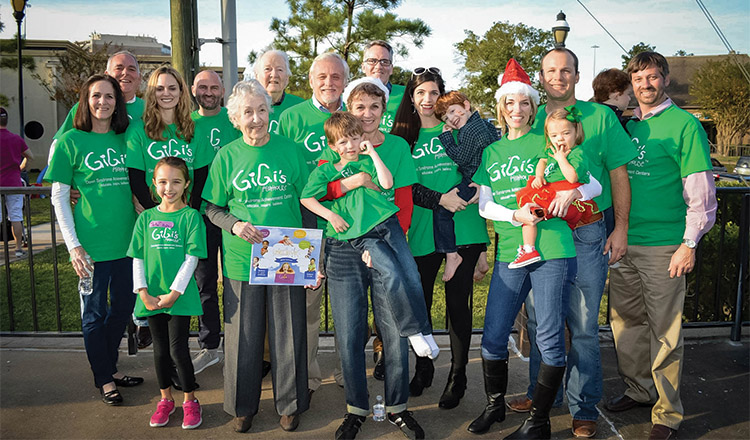When Ammie Hudson-Blahuta (HHS’02) prepared to cut the ribbon at the grand opening of GiGi’s Playhouse Sugar Land with a huge pair of scissors, surrounded by family and friends, she realized that Sugar Land, Texas, was taking a big step forward.
For Hudson-Blahuta, a mother of two, the snip signaled a goal accomplished. “When the Central Fort Bend Chamber was there helping with the setup and they brought out the big scissors, it hit us that we had support from the whole county,” Blahuta says. “We had 300 people at that grand opening. To hold those scissors and make that cut — it was very special.”
GiGi’s Playhouse Sugar Land is one of more than 35 GiGi’s Playhouse locations in the world. The playhouses are achievement centers that provide educational and social programs for children and adults with Down syndrome. For Hudson-Blahuta and her husband, Keith, the birth of their daughter Sadie marked the start of their journey to that December 2015 grand opening. “When Sadie was born, her bloodwork confirmed she had Down syndrome,” Hudson-Blahuta says. “We were in shock and did not know what to do.”

The desire to give Sadie all the social and educational opportunities available motivated the family to seek out local programs; while facilities were available in Houston 22 miles away, the distance could be daunting for resources needed regularly. “We knew many families in the area wanted to be a part of something nearby,” Hudson-Blahuta says. “Houston is so large. It might not be that far away miles-wise, but it still takes a while to get there.”
Once there was an identified need, Hudson-Blahuta, her family, and staff members became part of an investigatory process that stretched from Houston to Indianapolis. Hudson-Blahuta had heard about GiGi’s Playhouse, and she reached out to existing locations for advice. Staff at GiGi’s Playhouse Indianapolis provided input when it came to equipment, interior color combinations, and the creation of a donor wall. “I knew Purdue people,” Hudson-Blahuta says. “It’s nice to be able to pool information from people who have been in your shoes and can help you along the way.”
The two largest programs at the Sugar Land GiGi’s are the 5-and-under group and the adult group for attendees 18 and older. Early learners experience activities that incorporate music, art, and language and draw on motor skills and sensory awareness. Evidence has shown that music and dance-oriented video games can be an important part of the learning process. “Many kids with Down syndrome are visual learners,” Hudson-Blahuta says. “A multisensory approach to education sets them up for success.”
For adults, the focus shifts to gaining independence by improving daily skills. “The adult program was one of the reasons we fell in love with GiGi’s,” Hudson-Blahuta says. “Once kids with Down syndrome have graduated from high school, we want to help bridge the gap to adulthood. The lessons revolve around everyday essentials like cooking and eating healthily, smart shopping, and balancing a checkbook.”
It was not that long ago that many young children with Down syndrome faced a different outcome. “We have one participant who is 55, and she comes to the playhouse every week,” Hudson-Blahuta says. “Her parents were basically told that they should put her in an institution when she was a child. That’s not what they wanted to do, but that has happened for many people.”

Hudson-Blahuta is a fourth-generation Boilermaker. As a student, she witnessed the many small ways a large community can come together. “Purdue is a big school numbers-wise, but you never felt like it was,” she says. “You always felt like you belonged, and you knew your professors.” Her service efforts through Kappa Kappa Gamma at the University provided a glimpse into her future. “Our sorority worked with Special Olympics,” she says. “One day, I’ll have the joy of seeing my daughter participate in the organization’s competitions.”

